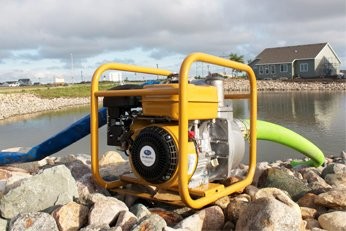Emergency preparedness
Knowing the basics on pumps and generators can help you be prepared in the event of an emergency.

During this time of year, flooding and power losses are common side effects of volatile weather. Two critical pieces of equipment to have on hand during storm season are pumps and generators. Small de-watering pumps are ideal for moving water, while portable generators are crucial in the event of a loss of power. Different models of pumps and generators exist and each are targeted at unique applications or demands. Understanding the difference between various models will help in deciding which unit is best to rent.
Pump it up
De-watering pumps are built with different types of water in mind. While a centrifugal pump is the best and most inexpensive choice for applications where clear water must be moved, floodwater often isn’t completely clean and clear.
Semi-trash and trash pumps have thicker impeller vanes and a larger volute discharge opening than centrifugal models. Small debris up to ¾ of an inch can flow through a semi-trash pump, while small sticks, stones and other debris up to 1 ¼ of an inch can successfully pass through a trash pump. If there is the possibility that there could be debris in the water, err on the side of caution and be prepared with a semi-trash or trash pump.
Finally, in cases where the floodwaters could be very muddy or contain much larger trash particles, a diaphragm pump will work best. Diaphragm pumps are capable of handling sticks, stones, mud, trash and other debris up to 2 inches.
In addition to pumps, it’s also wise to have good grasp on potential power needs in case of an emergency.
Generating some power
When choosing a backup generator, the first consideration should always be safety. If the generator will be used in an enclosed space, only a battery-powered unit is acceptable. Gas-powered generators are ideal for the outdoors, so long as they are kept a safe distance away from open windows or people. Next, make a list of what will run off the unit in the event of a full power loss. This will help to determine what should be rented – inverters, conventional models, or a mixed fleet of the two.
Inverter generators offer “clean” power, especially suited for sensitive electronics. The power runs through an inverter board, producing purely manufactured power. Sensitive electronics run best on this “clean” power because voltage fluctuations can cause computers to reboot or affect components that will later need to be recalibrated. Additionally, inverter styles are ideal when quiet operation is desired, as they tend to run much quieter than conventional models.
Inverter generators will typically cost more to rent. If the budget is tight, some manufacturers do offer conventional models that utilize automated voltage, with a regulator controlling voltage level. This keeps the power more stable, and “clean”, acceptable for those sensitive electronics typically requiring an inverter model. Also, if the budget won’t allow for inverter models and quiet operation is the main concern, components such as large mufflers and air cleaners are aimed at reducing noise and can lower the decibel level of conventional generators.
Standard conventional, or industrial-grade generators, work well for lighting and many outdoor power tools and equipment. But remember, these types of standard generators aren’t recommended for powering sensitive electronics for any considerable length of time.
No one can predict the intensity or the timing of Mother Nature, but anyone can be prepared for the havoc storms can cause. Knowing the basics on the equipment will allow you to quickly rent the best products to meet the demands of any emergency.


